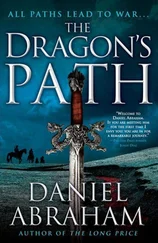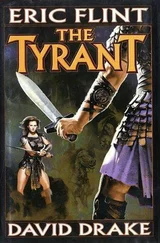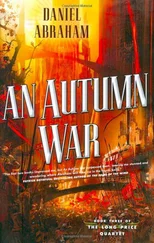As the light waxed, she washed her face and put up her hair. The sounds in the street changed. The rattle of carts, the shouting of carters. Dogs barked. The sounds of Camnipol in the grip of winter. Dawson had hated being in the capital city during winter. Winter business, he’d called it, and his voice had dripped with contempt. A man of his breeding should spend the winter months on his lands or else with the King’s Hunt. Only now, of course, there were no lands. Lord Regent Geder Palliako had taken them back for the crown, to be doled out later as a token to someone whom he wished to reward. And Clara was living on an allowance scraped together by her two younger sons. Her eldest boy, Barriath, was gone God only knew where, and her natural daughter was busy clinging to her husband’s name and praying that the court would forget she had ever been called Kalliam.
In the common room, Vincen Coe sat by the fire, waiting for her. He wore his huntsman’s leathers, though there was no hunt to call in the city and the master he’d served was dead. The perfectly ridiculous love he professed for Clara shone in his eyes and in the uncertain way he held himself as she walked into the room. It wasn’t at all dignified, but it was flattering, and despite herself she found it endearing.
“I’ve saved you a bowl of the morning oats,” he said. “And I’m making fresh tea.”
“Thank you,” she said, sitting beside the little iron stove.
“May I be permitted to walk with you today, my lady?” It was a question he asked every day, like a child asking a favor of a beloved tutor.
“I would be quite pleased with some company, thank you,” she said, as she often did. Often, but not always. “I have several errands today.”
“Yes, ma’am,” Vincen said, and did not ask what they were, because he knew.
She was going to overthrow the crown and, if she could, destroy Geder Palliako.
She didn’t have a concrete plan yet, but she’d lived her life in court. She had seen any number of quiet campaigns of social sabotage and destruction. The secret was no secret: build friendships and connections, talk about trivialities, and listen closely to what was said. The women who failed were always the impatient, the ones who tried to force others to their own opinion or engineer a false scandal. Making opportunities rarely worked, and watching for them almost always did.
Her first stop, as it had been most days, was a baker’s shop near the western edge of the Division. The baker was one of the few Yemmu to make a home in Camnipol, his body wide and thick, the tusks that rose from his lower jaw carved and inlaid with tribal markings of the Keshet. He looked like a curiosity in a show of exotics, but he spoke without an accent.
“Ah! The queen of pigeons! Come in, come in.”
Clara smiled, though in truth she thought the man’s pet name for her was a bit presumptuous.
“And how are you this morning, Melian? I hope your wife’s feeling better.”
“Much better, my lady,” the baker said, hoisting a cloth bag of stale rolls and yesterday’s small loaves from behind the counter. “I’ll tell her you asked.”
Clara’s allowance was generous without being extravagant. It would have kept her in much more comfortable conditions if she’d chosen to spend it differently. The smell of fresh bread was a temptation each day she came, rich and earthy, sweet with molasses and rich with baked walnuts. She pushed two thin coins across the countertop, and the baker brushed them into his wide and waiting palm.
“The pigeons eat well again today,” he said, grinning. Apart from his decorated tusks, his teeth were wide and yellowed by time and coffee.
“Perhaps this time they’ll be grateful,” Clara said with a smile as Vincen took up the bag and held the door open for her.
The streets were white with old ice where they weren’t black with mud. Low, bright clouds dropped balls of frozen rain the size of baby’s teeth, too compact to be called snowflakes and too soft for hail. The air smelled wet and cold. The great families were gone from the city for the season, but the traffic on the street was hardly less. The year that had passed had left a great deal of work to be done. The short, victorious war against Asterilhold and then the doomed, hellish revolt within the walls of the city. The process of rebuilding was evident in the streets. Carts with great timbers heading toward the north where noblemen’s compounds had burned. Great slabs of marble and granite creaking toward the palaces where walls and façades had been broken or scorched past cleaning. And even now, prisoners hauling debris—old barricades or ruined carriages or sometimes still the bodies of the lowborn dead—to the middle of the great bridges and dropping the garbage into the distant chaos at the bottom of the Division. The city as it had been was gone. Busy as a kicked anthill, Camnipol struggled to remake itself. Clara didn’t think much of what it was becoming.
The Prisoner’s Span was the southernmost of the great bridges that crossed the Division, and the oldest. Its design was plain, and the trunks of the massive trees that had been felled to create it were dark with tar to repel insects and keep the bridge from collapse. The wind bit and made the great structure creak like a ship at sea. The condemned of the city hung in cages below, great iron chains and thick straps of woven leather the only thing between the prisoners and the long fall below them. At the center of the span—as every morning—the prisoners’ families and friends gathered, trying to drop enough food and water down through the open air to keep the captives alive until their sentence ended. If a man was condemned without a wife or child who would come each day and lower down water and bread, then even a week’s detention was death. The crown felt no obligation to offer care for criminals. Clara had heard stories of brotherhoods of cutthroats and thieves that collected dues like any of the great fraternities, and guaranteed sustenance should their members fall afoul of the magistrate. She’d even seen some men on the span who might have been part of such a group. For the most part, though, it was family. Dirty, small women lowering baskets on twine. Desperate-eyed men dropping bits of cheese down to the opened palms of their wives and lovers. There were tales of someone leaning out too far, and the prisoners watching, trapped, as their saviors fell through the empty air to die far beneath them.
And then there were the others. Boys, mostly, who came to piss off the edge of the span or rain dead animals and rotten fruit on the heads of the prisoners. The city guard did nothing to stop them. Encouraged them, even. There were also tales of one of those boys losing his footing, but those weren’t told in the grim tones of tragedy.
Clara went from one end of the span to the other, slowly emptying her bag. Here was Shuler, the pickpocket’s wife, accepting yesterday’s roll for her half-frozen husband. Here Cassian the Tralgu, the tips of his doglike, mobile ears almost blue with the cold, come to visit his father in the cages. Here Berrin, whose sister had been caught witholding taxes. Here Taracali, whose son had killed a neighbor’s dog. Clara gave food to them all, stopping to talk to each of them, to learn their names and their stories, to touch them on the arm or the shoulder or the hand. She came as an agent of mercy, witnessing without judgment and sympathizing without pity.
And though they did not know it, she gathered them as allies.
When the bag was empty, Vincen folded it into his belt, and they walked together to the eastern end of the bridge, then turned north, toward the Kingspire. The streets widened and the architecture grew more ornate as they went on. Soon, she and Vincen were walking among the houses of the wealthy, and not long after that, the noble. Servants had cleaned the streets here, the black cobbles free of horse shit and old ice. Laborers’ carts made way for carriages and palanquins. The houses rose up three and four stories high, and the mansions had gardens and grounds of leaf-bare trees and brown hedge. Clara had spent most of her life in streets like these, riding in carriages and thinking nothing of it. It had only been months since she had been Baroness of Osterling Fells and wife of the Lord Marshal. Already, she felt like she was traveling in a foreign land. She stopped at a café and bought three chicken pies and a skin of watered wine, and the girl behind the counter pretended not to know her.
Читать дальше










